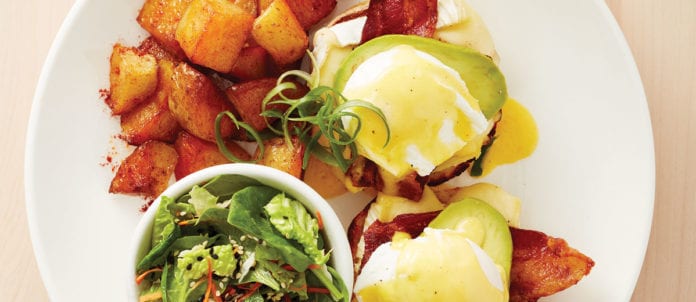Anticipating the needs of an increasingly diverse population isn’t easy, but that’s exactly what breakfast and brunch operators need to focus on. Today’s diner wants high-tech user-friendliness with a homestyle feel; quick-service, on-the-go meals with local, ethically sourced ingredients; and satisfying health-forward menu items.
Operators also need to be aware of generational shifts and the associated diner preferences. Packaging, ingredient sourcing and menu diversity have become paramount business and marketing decisions. Where once breakfast-and-brunch items consisted of pancakes, maple syrup and “two-eggs-any-style,” diet, lifestyle and increasingly adventurous appetites now demand consideration.
“Gone are the days of mass production as we move to an era of mass personalization,” says Toronto-based Nourish Food Marketing’s 2020 Nourish Network Trend Report. Well-known brunch restaurant Lady Marmalade, with locations in Victoria, B.C. and Toronto, built a thriving business on this once-niche segment in 2005 by making personalization a part of its business model.
Focusing solely on brunch made with locally sourced ingredients, Lady Marmalade’s menu is extensive and varied, with a fully customizable eggs-benedict feature. Starting at $12.50, its Build-Your-Own-Benedict option includes an array of ingredients (including cured salmon, $5; mango salsa, $2; and queso fresco, $2.75) combined with Hollandaise sauce and served with home fries and salad.
Lady Marmalade also forgoes alcoholic beverages. While many still consider brunch and cocktails — such as mimosas and Caesars — to go hand in hand, others, such as Nourish Marketing president Jo-Ann McArthur, beg to differ.
“We know there’s a new generation of drinkers who are rethinking alcohol,” she explains. “That doesn’t mean they don’t want ‘drinks with benefits’ or aren’t willing to pay for them.”
In fact, alcohol-free cocktails enhanced with nootropics — cognitive enhancers — such as caffeine or adaptogens (plant-based de-stressors such as turmeric) are becoming increasingly popular with today’s younger diners and Nourish’s 2020 report also shows “fun drinks,” such as soda, are making a comeback.
In downtown Toronto, The Depanneur has been running pop-up-style food events for the past nine years — including its Newcomer Kitchen, which brought newly arrived Syrian-refugee families into the kitchen to share their culture, food and earn an income — as a non-profit social enterprise.
“Brunch [at The Depanneur] is a little atypical in that we’re not licensed,” says founder and owner Len Senater. “It’s not a luxury experience and we’re not catering to the hungover crowd with heaping, greasy plates of food. Our brunch is more locally focused.”
True to its pop-up image, The Depanneur’s brunches are run by different chefs-in-residence each year. For 2020, diners are invited to experience the Filipino flavours of Mama Linda’s chef Maria Polotan. Featuring traditional dishes such as silog (garlic-fried rice with sunny-side-up egg and green-papaya pickle, $8) and tocino (Filipino-style bacon, $5), as well as Filipino hot drinks salabat (ginger tea with honey and lemon, $3) and tsokolate eh (Filipino hot chocolate, $5), these are the brunch dishes modern Canadian diners crave — hearty and comforting, but with vibrant, global flavours, that offer a new food experience.
“[Polotan] is a phenomenal cook,” Senater says. “I spent many years wondering why I couldn’t find great Filipino food. Everything I knew about the area — the location, the cultural influences — indicated to me that the food should be fantastic, but every time I encountered it, I was disappointed. Then I noticed a few different places that are doing something special.”
“Mama Linda’s was at the Withrow Park Farmers Market when I asked [Polotan] to take on the brunch for 2020,” he continues. “She was a tenant of our rental commissary. I had invited her to host some one-off events and her food really blew me away.”
While Canada’s changing breakfast-and-brunch climate may reveal alcohol-weary diners looking for exciting new food experiences, QSR breakfast-offerings remain popular as breakfast continues to be one of the few growth areas in the segment, according to research by Toronto-based NPD Group.
At McDonald’s Canada, breakfast has been on the menu for more than 40 years. Catherine Crozier, senior director of Marketing at McCafé and McDonald’s Canada, says the key to its breakfast success over the years has been allowing the breakfast menu to evolve; adding small but impactful changes over the years while maintaining the older favourites.
Since the launch of its McGriddle breakfast sandwiches in 2003, the past two decades have seen, perhaps, the most significant changes to McDonald’s breakfast menus. In 2011, it launched its McCafé brand, successfully introducing a full range of specialty coffee drinks. In 2015, the company announced it would use only cage-free eggs in its breakfast-menu items and then, in 2017, breakfast-menu items were made available throughout the day.
“While a large proportion of our guests still consume breakfast in the morning, the all-day-breakfast offering has had a positive impact on McDonald’s,” Crozier says. “Our classic Egg McMuffin sandwiches continue to be our most preferred item on our breakfast menu, with breakfast-bagel sandwiches also generating strong [sales]. While breakfast is typically associated with savoury, the gap to fill at McDonald’s is its sweet menu offerings. For example, the expansion of our bakery menu with new McCafé L’il Donuts has seen early success, tapping into previously unmet demand in this space.”
“Our own consumer research also reinforces the importance of loyalty programs for coffee and breakfast among our guests,” she adds. “McCafé Rewards is one of the top programs in Canada, [whereby] our guests can earn and redeem in-restaurant, at drive-thru and even when ordering ahead on the My McD’s app.
McDonald’s is currently testing two new limited-time menu items in Alberta, Northwest Territories and Lloydminster, Sask. The Chicken McMuffin and Chicken McGriddle both feature peppery, seasoned Canadian chicken, while the McGriddle takes on the classic flavour profile of chicken and waffles. McCafé L’il Donuts, recently tested in B.C. and Atlantic Canada, are available in five flavours and boast 180 calories or less.
“Both are something our guests have been asking for and the tests in market are going well,” Crozier says.
In Quebec City, Chez Muffy, located in the award-winning Auberge Saint-Antoine Hotel, is a family-friendly, farm-to-fork restaurant in a historic warehouse, which dates back to 1822. While the ambiance is classic Québécois comfort — original wooden beams and a warm, inviting atmosphere featuring views of the St. Lawrence River — the menu highlights the best available local products.
Boasting its own organic vegetable garden on Île d’Orléans, located 20 kms from the restaurant, chef Romaine Devanneaux works closely with garden manager Alexandre Faille to plan for seasonal-vegetable use year-round — even during Quebec’s harsher winter months.
While the growing season runs from April to December, Devanneaux and Faille work to ensure the food grown can be used throughout the year through methods of fermentation and preservation, among others. “We work with techniques like lacto-fermentation so we can preserve many of the vegetables from our garden,” Devanneaux explains.
Chez Muffy’s offers a full-service menu and valet parking for all hotel and restaurant guests — a rarity in Old Quebec — and its Sunday brunch buffet, with its unusual array of foods, has become popular with local and visiting diners.
“It’s not a typical brunch; our menu is not just [centred on] eggs,” general manager Guy Lombard says. “Ours is an epic buffet. We prepare the food fresh and our offerings include homemade pastries and tarts, vegetables from the garden, duck confit, maple-glazed ham and salmon with béchamel. We plan to continue working with the vegetables from the garden.”
At $50 per adult ($20 per child), the expansive buffet also features an eggs-benedict station with the choice of toppings, local cheeses and other Québécois specialties such as cretons. Buffet food quality can be difficult to maintain, but Chez Muffy has it down to a science.
“[We’re offering] a high-end brunch buffet,” says Lombard. “Everything has to look brand new at all times. Heat source is very important. Using traditional chaffing dishes often means you cannot regulate the temperature, so we’ve invested in induction chaffing dishes for consistent heat distribution. [Overall], we achieve a cozy ambiance. We want our guests to have a relaxed and enjoyable dining experience.”
Story by Janine Kennedy


















